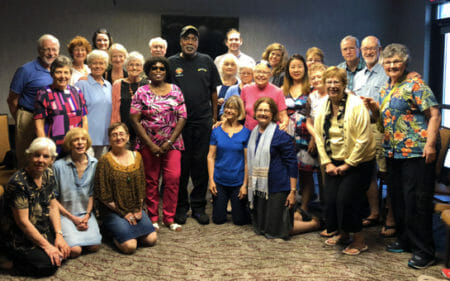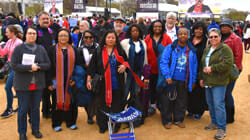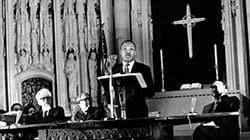ABHMS supports church’s civil rights pilgrimage

The church group with Sarah Collins Rudolph (in dark eyewear)–a survivor of the 16th Street Baptist Church bombing of 1963–and her husband, George Rudolph.
As we remember Dr. Martin Luther King Jr. on the holiday that bears his name, American Baptist Home Mission Societies reminds readers of the long struggle for civil rights in the United States.
Four of the 27 individuals on Old Cambridge (Mass.) Baptist Church’s 11-day civil rights pilgrimage last June were able to participate because of scholarships made possible through the generosity of church members and American Baptist Home Mission Societies (ABHMS).
“The trip was a pilgrimage—not a tour—because we visited sacred places and expected to learn and be transformed from them. This was, indeed what happened,” wrote the church’s then-moderator, Leslie F. Hergert, in a report to ABHMS. “We visited museums in Atlanta, Montgomery, Selma, Birmingham, Indianola [Miss.] and Memphis [Tenn.], learning not only about the Civil Rights Movement but the horrors of slavery, lynching and the depravation that led to it.”
The church group followed the route of those who marched from Selma to Montgomery, Ala., in 1965 in support of voting rights for people of color. The group crossed the Edmund Pettus Bridge, where, on March 7 of that year, peaceful marchers were met with billy clubs and tear gas in what became known as “Bloody Sunday.”
Stops included Martin Luther King Jr. National Historical Park and the National Center for Civil and Human Rights, both in Atlanta, as well as the Rosa Parks Museum, Equal Justice Initiative’s Legacy Museum and the Southern Poverty Law Center, all Montgomery, Ala.
The group worshiped at Birmingham’s 16th Street Baptist Church, where four African-American girls were killed by a Ku Klux Klan-planted bomb in 1963. In addition, the pilgrims met with survivor Sarah Collins Rudolph, who lost an eye in the attack.
They held brief memorial services for, among others, Medgar Evers and Emmett Till. Evers’ service was held at his historic Jackson, Miss., home. A civil rights activist, Evers was assassinated in the 1960s. Till’s service took place at Bryant’s Grocery & Meat Market, Money, Miss., where, in 1955, a white shopkeeper accused the 14-year-old African American of whistling at her. The shopkeeper’s husband and his half-brother then tortured and murdered Till.
Among those with whom the group met were Annie Pearl Avery and Hollis Watkins, both of whom were active with the Student Nonviolent Coordinating Committee during the 1960s Civil Rights Movement. Today, Avery is active with the “Poor People’s Campaign: A National Call for Moral Revival,” and Watkins is a co-founder of Southern Echo, a leadership development, education and training organization in Mississippi.
“The courage of the civil rights pioneers we visited in museums and in person was remarkable,” wrote church member David Entin. “In the face of not only intimidation and humiliation but also of death itself, these brave individuals persevered. We were moved by the willingness of many to forgive perpetrators—even unrepentant ones—and inspired by the faith of many, whose belief in God and Jesus was the source of their strength and courage.”
ABHMS remains committed to social justice. Read more throughout ABHMS’ website and via The Christian Citizen, which ABHMS publishes online regularly and in print several times yearly.




